The Patriarchate of Constantinople has joined the fight for parishioners and property (and, accordingly, their money) of the Ukrainian Orthodox Church, offering its “roof” to the Ukrainian Orthodox Church, which is being subjected to repression. According to Phanar's plan, this structure should accept the clergy and parishes of the UOC after its ban.
The Office of the President of Ukraine, together with Phanar, is preparing to register the Ukrainian Orthodox Church of the Constantinople Patriarchate, which, according to their plans, it will join after its ban. This was stated by Ukrainian politician and public figure Igor Mosiychuk, reports website of the Union of Orthodox Journalists of Ukraine.

Igor Moseychuk. Photo: znaj.ua
“A new church will be created, or rather registered, in Ukraine – the UOC KP (just don't think that it is the Kyiv Patriarchate), the UKRAINIAN ORTHODOX CHURCH OF THE CONSTANTINOPLE PATRIARCHATE. This church, or rather the exarchate (branch) of the Constantinople Patriarchate, according to the plan of the Istanbul Phanar and our Bankova, should accept the clergy and parishes of the UOC after its ban,” the former deputy of the Verkhovna Rada writes.
According to the politician, they want to vote for the ban of the UOC in agreement with Bankova at the first plenary session. After which the authorities intend to offer the clergy and believers of the UOC to move to this structure.
Operation Intercept
Trying to ban the activities of the Ukrainian Orthodox Church by any means, the Ukrainian authorities encountered unexpected resistance. The UOC leadership found lawyers who were able to link the repressions against the church to the Magnitsky Act, which existed in the 1980s in the United States. It allows sanctions to be imposed on politicians convicted of repressions against religious organizations.
A dilemma has arisen: the Verkhovna Rada has been trying to pass law No. 8371 for more than six months, which is expected by those who see the UOC as an “enemy” image, created over the past few years. On the other hand, the adoption of law 8371 threatens sanctions for everyone who votes for it.

As a result, it seems that the government is deliberately delaying the process of banning the UOC. Many deputies hope that this will not have to be done at all. Nevertheless, the speakers speaking on behalf of the government continue their aggressive rhetoric against the church.
The issue of banning the UOC remains relevant, and at any moment the current pause may give way to an active phase. When will this happen? When the arguments in favor of the ban outweigh the fear of sanctions. The question is who will put forward these arguments and how exactly. It is quite possible that our elected representatives will receive an offer they will not be able to refuse. What kind of offer is this?
Ban in favor of the Exarchate
Unfortunately, our politicians (though not only ours) can make some decisions to the detriment of both themselves and the country. This happens when the threat of hypothetical punishment in the future recedes before political pressure in the present. In this case, there is a force that can create problems for the Ukrainian government now, and not when certain sanctions are adopted against its individual representatives. What is this force? These are those who need full control over the Ukrainian Orthodox Church.
Our editorial office has information that already in August, the Ukrainian people's deputies will nevertheless make a decision to ban the Ukrainian Orthodox Church, despite the extremely unfavorable political consequences. Our sources name the Constantinople Patriarchate as the main initiator and lobbyist of this decision.
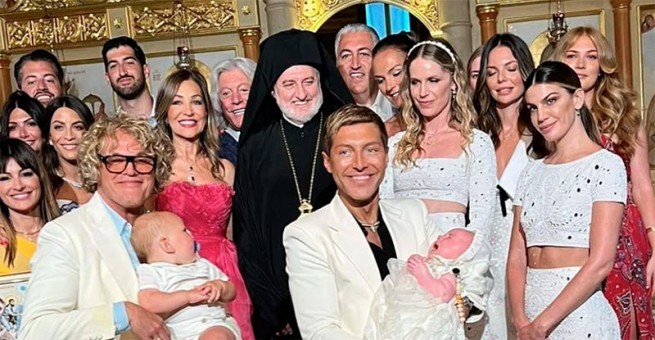
Metropolitan Elpidophoros of America at the baptism of a same-sex couple in Athens
It is clear that any Phanar functionary (for example, Metropolitan Emmanuel of Chalcedon or Elpidophoros of America), no matter how high his status, cannot exert significant influence on Ukrainian politics without outside support. Who exactly supports the patriarchate is known to everyone. Just as it is known who will benefit most from the ban on the UOC – not hypothetically, as in the case of OCUbut in the literal sense of the word. We are talking about the Patriarchate of Constantinople, which would grow with new dioceses, churches and monasteries, currently under the jurisdiction of the UOC. In what way? In the same way that has been actively used for centuries – through the exarchate.
According to our information, the adoption of Law 8371 should launch the process of establishing the Exarchate of the Patriarchate of Constantinople in Ukraine. It currently exists almost nominally, but if the UOC is banned, its position may significantly strengthen. And then comes the most interesting part.
The problem of the OCU
The fact is that Phanar has been pondering for the past few months how to get out of the situation the church found itself in after granting the tomos to Epiphanius Dumenko. If in 2018 the Patriarchate of Constantinople hoped that the recognition of the Ukrainian schismatics would go smoothly, by the “domino effect”, then by 2024 it became clear that this would not happen. The main reasons are the lack of canonical ordination for Dumenko and the extremely aggressive behavior of representatives of his structure towards the canonical church.
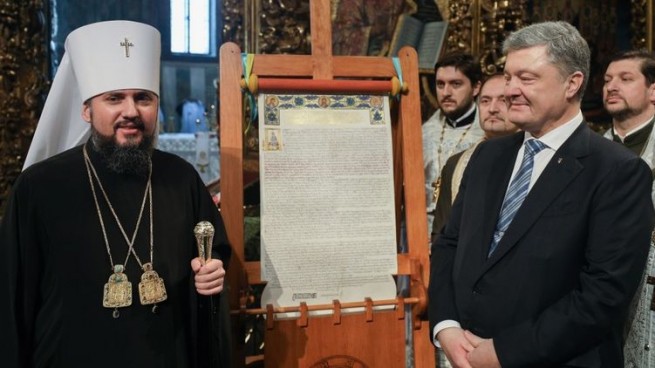
The Primate of the Orthodox Church of Ukraine (OCU) Filaret Denisenko and her “spiritual” father, former President of Ukraine Petro Poroshenko, in Fanari during the presentation of the tomos.
But if the absence of canonical ordinations among representatives of the former Kyiv Patriarchate at Phanar is somehow being justified by the fact that Filaret Denisenko, who ordained all of his “bishops,” was for a long time a canonical bishop of the Russian Orthodox Church, then it is impossible to explain the beating of believers, the seizure of churches, and the destruction of the holy relics of the church that until recently was recognized by all as the only canonical church in Ukraine.
Moreover, it is extremely difficult for the Phanariots to explain to representatives of other local churches the low level of religiosity of the OCU believers and its empty churches.
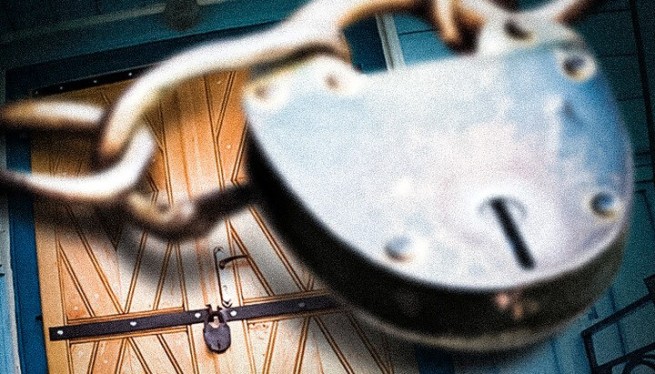
Now the name OCU is deciphered as “Empty Churches of Ukraine”. Empty churches do not bring in money, which seriously disappointed Fanari.
Today, the Patriarchate of Constantinople has apparently realized that it has accepted into its family people who have an indirect relationship with Christianity. The granting of the tomos to the OCU did not bring the Phanar the dividends that Patriarch Bartholomew repeatedly declared, but it significantly undermined its authority in the Orthodox world. This is evident from the almost complete absence of communication between the Patriarchate of Constantinople and other local Orthodox churches (with the exception of Greece and Africa).
In other words, the Phanariots created problems for themselves by rejecting a multi-million church with a huge number of believers, priests, monks, bishops, monasteries and temples, and by granting legitimate status to people who are far from Christianity. How to solve this problem?
Exarchate and Law 8371
This problem can be solved by convening a Pan-Orthodox Council and listening to the opinion of the majority of local Orthodox churches, revoking the tomos from the OCU and returning it only after the repentance of all members of this structure. However, this would mean admitting their mistake, which the Patriarchate of Constantinople does not want to do. That is why several months ago the idea of maximally expanding the exarchate of the Patriarchate of Constantinople in Ukraine arose there.
Nominally, it already exists: its head, Bishop Mikhail Komansky, is trying to establish ties with a certain part of the episcopate and clergy of the UOC. However, this process is proceeding sluggishly, and we do not observe any particular zeal in uniting with the exarchate on the part of the hierarchs of our church.
Therefore, the idea arose at Phanar to “push” the UOC bishops into the structure of the Constantinople Exarchate in Ukraine. To do this, it is necessary to adopt Law 8371, according to which each church community and monastery that fails to prove the absence of canonical ties with the Moscow Patriarchate is subject to prohibition and subsequent liquidation. In this situation, the exarchate will be presented as an alternative to both the OCU and the ROC, since the overwhelming majority of Ukrainian bishops do not want to have anything in common with either of them: it is dangerous to be friends with some, and unpleasant with others.
According to the information we have, negotiations about the exarchate with the bishops of the UOC have been ongoing for at least the last three months.
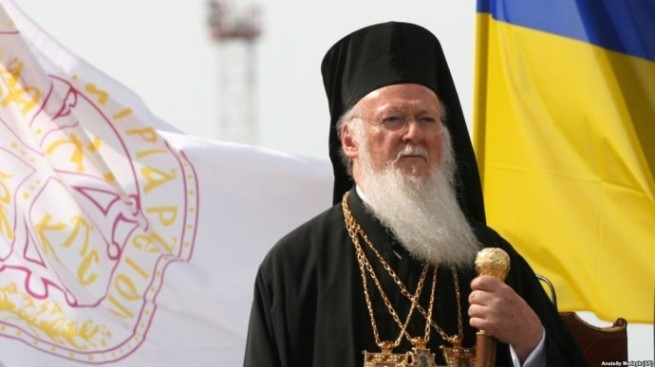
Solution to the “OCU problem”
By creating a powerful exarchate in Ukraine, Phanar solves two problems. Firstly, it receives a multi-million flock with monasteries, churches and clergy raised in the spirit of love for Christ and the Gospel, which is very important for modern Phanariots. Secondly, the “problem” of the OCU is actually solved. Because if 90% of the bishops of the Ukrainian Orthodox Church and the same number of parishes go to the Phanar exarchate, then the OCU and Dumenko will very quickly disappear from the historical arena, turning into a marginal group that will not be recognized by all other churches.
In this case, as we have already said above, the OCU finds itself in an extremely disadvantageous position. After all, being part of the Constantinople Exarchate, representatives of the UOC will be able to pray freely in Jerusalem, on Athos and in any other place, which for the most part representatives of Dumenko's organization cannot do. This will lead to the fact that healthy forces of the OCU will gradually begin to migrate to the Ukrainian Exarchate of Phanar, and the OCU itself will turn into a small marginal group of “bishops” and “priests”, reminiscent of the UAOC in recent years before the granting of the tomos.
The Phanariots hope that this process of the UOC's transition to the exarchate will be painless, without physical violence and seizures of churches, which would add bonuses to the Patriarchate of Constantinople. However, the question arises: how legitimate is this decision of the Phanar?
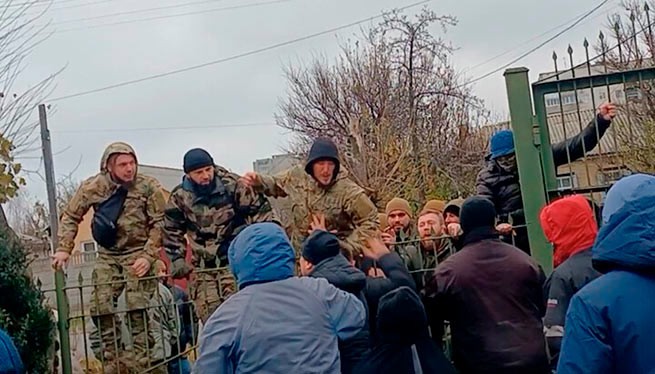
Footage from one of the church seizures in Ukraine. More details in the publication Ukraine – Europe and the broken jaw of a priest
In fact, if this happens, we will witness yet another outrage on the part of Constantinople towards Ukraine and our church. This situation looks not only absurd, but also extremely scandalous, because it can only be called theft of someone else's property.
On the other hand, from the point of view of historical reality, this is not the first time that Phanar has committed such actions, “finishing off the weak.” Let us recall at least the recognition of the “Living Church” in the twenties of the last century, when the Bolsheviks practically destroyed the Russian Orthodox Church, or the creation of the Western European Exarchate of Parishes of the Russian Tradition in Europe with its subsequent destruction. Such actions, from our point of view, are sinful and unacceptable. However, Phanar views them differently, based on its own benefit and justifying its actions by the benefit of those at whom they are aimed.
In other words, Phanar believes that by creating an exarchate, it is giving Ukrainians an alternative, providing the opportunity not to go to the OCU and not to remain in the ROC. At the same time, the opinion of the Ukrainian believers themselves is not asked on this matter. The negotiations are being conducted by individual representatives of the UOC hierarchy, who are also not particularly concerned about what the majority of believers think about this. What will come of this will become clear very soon. But it is absolutely clear that difficult times await our church, and new problems await Ukraine, when three religious organizations will simultaneously exist on its territory.
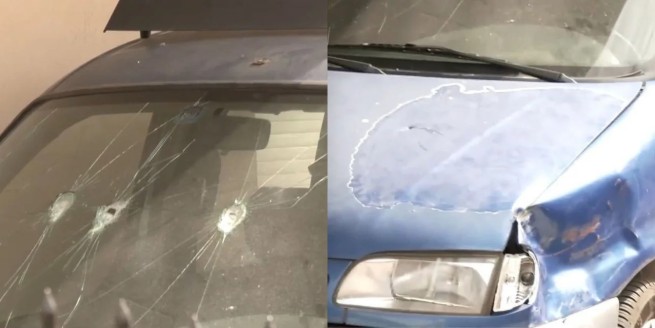
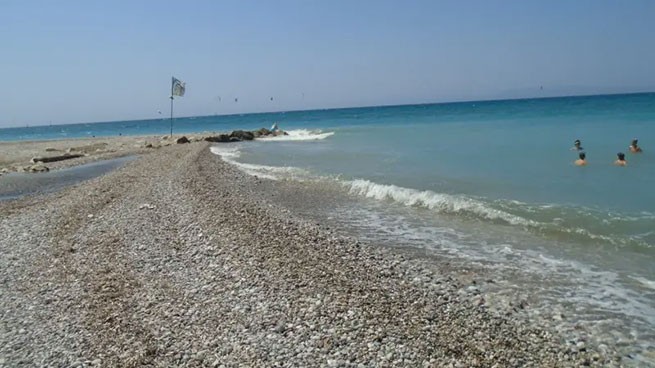
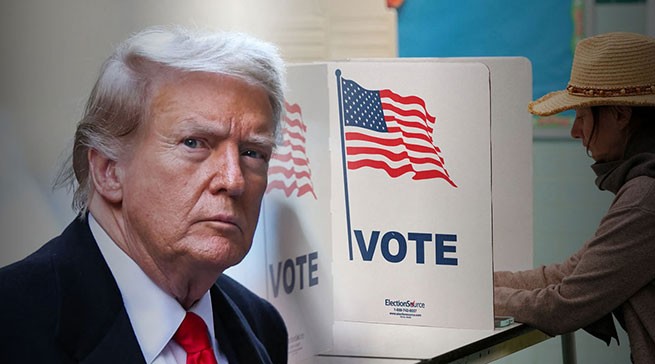

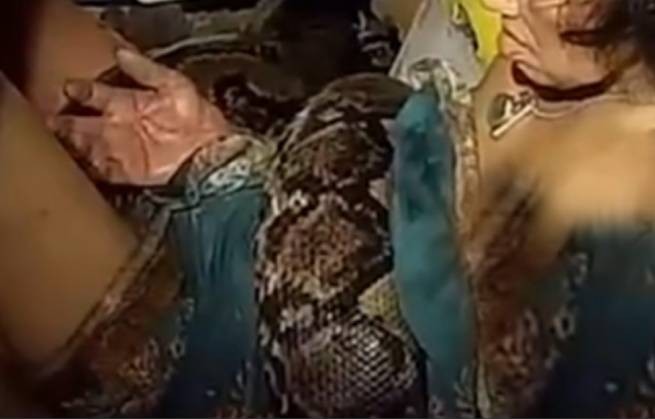
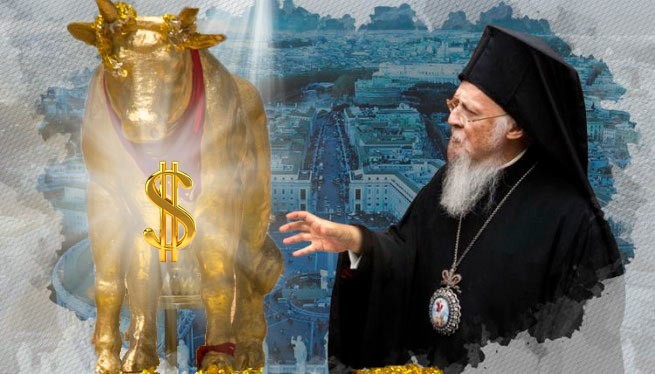

More Stories
Ukrainian Diaspora Abroad
Predator Scandal: US Sanctions Greek Intellexa Employees
NYT: Biden May Change His Mind (Video)